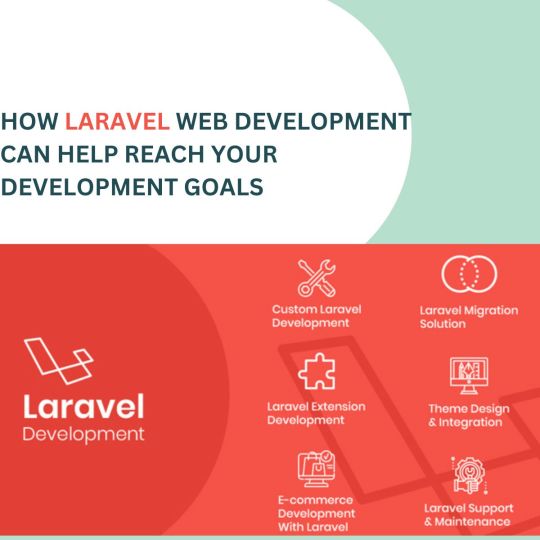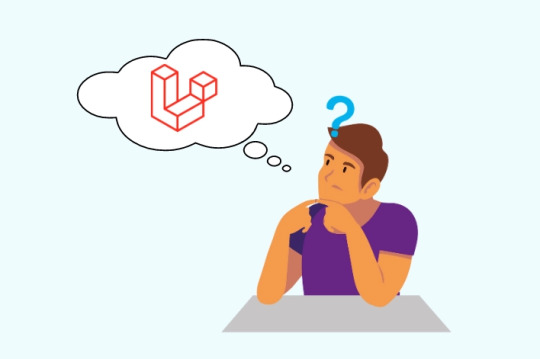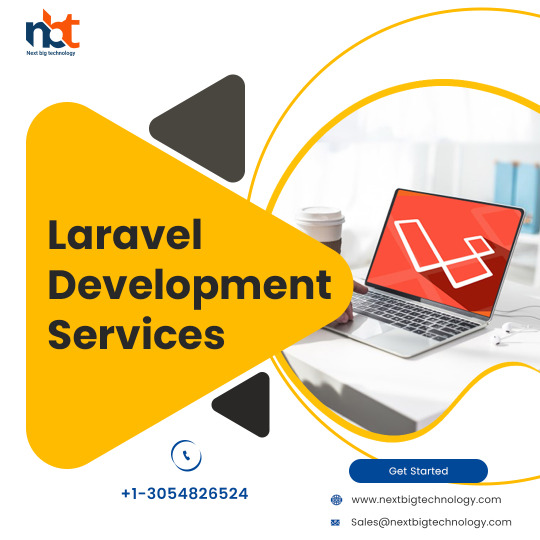#LaravelWebApplicationDevelopment
Explore tagged Tumblr posts
Text
Why Hiring Top Laravel Developers is Essential for Scalable Web Development

When it comes to building dynamic, secure, and high-performance web applications, Laravel is a top choice for developers and businesses alike. Known for its elegant syntax and robust features, Laravel simplifies complex coding tasks, making it ideal for modern web application development. If you’re in London or the UK, partnering with a Laravel development agency can help you unlock the full potential of this powerful framework.
Whether you need a custom solution or want to improve an existing application, hiring top Laravel developers ensures your project is in expert hands. From Laravel web development to deploying applications on local servers for testing and debugging, Laravel local development services streamline the process and guarantee quality results.
For businesses seeking a reliable Laravel development service, engaging a team from a reputable Laravel web development agency is key. These agencies provide end-to-end solutions, including planning, development, deployment, and ongoing support. They have the expertise to handle everything from creating robust APIs to integrating advanced functionalities tailored to your specific needs.
By choosing to hire Laravel developers in the UK, you’ll benefit from professionals who understand the nuances of local markets and have experience delivering world-class applications. If you’re based in London, there are numerous Laravel developers in London ready to bring your vision to life.
Whether you’re a startup or an established enterprise, Laravel’s scalability and flexibility make it a smart choice for web application development. Collaborating with a top Laravel development agency ensures that your application is not only functional but also future-ready, capable of adapting to evolving technologies and user demands.
Take your project to the next level by hiring skilled Laravel developers today. Invest in quality, and watch your web applications thrive!
#LaravelWebApplicationDevelopment#LaravelLocalDevelopment#WebDevelopmentServices#CustomLaravelSolutions#TopLaravelDevelopers#WebDevelopmentAgency#HireProgrammer
0 notes
Text

How Can Laravel Support Your Development Objectives?
Find out how Laravel can assist you in reaching your goals for development. Our summary of the main attributes, advantages, and ways it can support the objectives of your website!
for more information, visit https://www.aistechnolabs.com/blog/laravel-can-help-you-to-achieve-your-development-objectives
0 notes
Text
Why Use Laravel for Your Next Web App Development Project?

Thinking about when and why use Laravel for web development? Take a deep dive into why Laravel remains the leading PHP framework even today.
#Whyuselaravelforwebdevelopment#laravelwebapplicationdevelopment#laravelwebapplicationdevelopmentservices#Whyuselaravel#laravelforenterprisewebapplication
0 notes
Text
Laravel Development Services
Need Laravel Development services? We are your go-to-product for Laravel Development services. Get in touch for a quote on your project requirements.

#nextbigtechnology#laravelapidevelopment#laravelwebdevelopment#laravelappdevelopment#laraveldevelopmentserver#laravelmaildevelopment#laravelmobileappdevelopment#laravelshopifyappdevelopment#laravelsoftwaredevelopment#laravelwebapplicationdevelopment
0 notes
Text
Top 8 Benefits of Using Laravel Framework for Your Business
For any business to expand its customer base, having a presence on the internet is a must. Without a strong worldwide presence, it is quite impossible to lead in the market. A website that is the blend of powerful technology, expert skill sets and solid strategy is necessary to accomplish your business goals.
However, enterprises are often overwhelmed when they are presented with a number of web development technology. If you are looking for a user-friendly and sales-driven website, Laravel application development is an ideal choice of many businesses because of the plethora of benefits it offers. In this post, we will discuss all the benefits of this framework that will help you in developing responsive, stable and user-friendly storefronts.
1 Simplified Authentication Systems
It is very important for the business owners to protect their resources as well as critical user data. In order to prevent unauthorized users from accessing paid or secured resources, you need to implement strict security measures. When you choose the Laravel app development, implementing the authentication system is pretty simple. You can easily organize authorization logic, control access and configure nearly everything out-of-the-box.
2 Integration of Rich Tools to Make Application Faster
In this present world, having just an application is not just enough. The application should be safe, feature-rich, and more importantly, faster. The faster the app, the more users will convert into customers. Integrating the caching back-end is often required to improve website performance. The Laravel enterprise application development provides support for several cache backends, like Memcached and Redis. The framework is configured in a way that uses the file cache driver and store cache objects in a particular file system.
3 Automated Testing
Testing is a crucial phase in any web development cycle. Without testing, you can never know what the developer has created will perform without any bugs, or crashes. Automatizing the testing process will consume less time and provide better results than manual testing. Laravel out-of-the-box offers support for testing with PHPUnit. It provides convenient ways to run tests and examine the output to make sure the software is running at peak performance.
4 Error and Exception Handling
Even the smallest error can impact your user experience and usability of your app. Proper error handling is often required while designing data entry forms. If a user is submitting the information, but your application is not allowing to submit because of inappropriate data entered, then the user needs to be informed about the error. Laravel comes with powerful error handling capabilities with Monolog logging library. Without proper error and exception handling, your users may think that the problem is with the application and they may leave your site.
5 Managing and Scheduling Tasks
Whether you want to send marketing emails to your subscribers in the morning or clean up cache memory at the end of the day, every web application needs some kind of task scheduling system that conduct tasks whenever required. Laravel itself has a command scheduler that allows you to define tasks and run them whenever you want to.
6 URL Routing Configuration
When your users use your application, they type and click on the links and wish to see desired content, description, product, contact page, etc. Without URL routing, the app will never understand what your users want to see and may land on the error page. In Laravel, all routes are defined in the app/Http/routes.php and automatically loaded, so your users can see whatever they are looking for.
7 Inbuilt Libraries
Libraries are an essential part of any web development framework as it facilitates much faster development in the efficient manner. Laravel comes with a number of pre-installed dynamic libraries, including Object Oriented libraries that you won’t find in other PHP frameworks. In addition to hassle-free implementation, Laravel libraries offers plenty of functionality to help you trigger events, send HTTP requests, generate views, etc. A whole host of libraries that is found only in Laravel makes it a popular choice amongst developers.
8 Fixed Common Technical Vulnerabilities
An application is always prone to security vulnerabilities, such as cross-site request forgery, SQL injection, cross-site scripting and so on. Being a secured platform, Laravel takes care of its security within the framework. The codebase is extremely protected and it has been examined by several experts. A good Laravel app development company never forgets to ensure security and fixes all the security vulnerabilities before delivering the project.
Conclusion
Laravel is the top contender when it comes to efficient web development frameworks as it contains all the features to create modern applications. However, the success of your application is majorly dependent on whom you choose for Laravel app development. If you are looking for a compelling website for your enterprise, ManekTech offers exceptional Laravel development services backed by years of experience and a wealth of knowledge.
0 notes
Text
Laravel vs. Symfony: Which PHP Framework is the Best for Your Enterprise?
PHP frameworks are often preferred by most developers when it comes to web application development. Frameworks, such as Symfony, Laravel, Zend, Codeigniter, CakePHP and Yii cover more than 80% of web applications that exist on the internet today. As a part of this family, Symfony and Laravel are the two most favorite frameworks, which are used across many enterprises. Being a leading Symfony and Laravel development company, we can help you leverage the full potential of PHP frameworks to drive your business value and create a lasting impression.
First, Why Use PHP?
You might not be a developer, but some questions may cross your mind like, which programming language is good for my website? PHP is a great choice for many reasons. PHP language supports fast page loading speeds, since it has its own memory space which allows faster code implementation. Moreover, PHP offers seamless database connectivity with a number of database services, including MySQL. The best thing about this language is it is absolutely free and it is accepted all around the world, so you can use it any web development and design project.
The Rise of PHP Frameworks
PHP stands for Hypertext Preprocessor that is a server-side scripting language used to create nearly every type of web application. PHP frameworks emerged as a means to facilitate the speedy development process. The reusable code and tons of components make it easy for developers to build web applications, saving considerable time and money. The frameworks come with pre-built modules that allow developers to focus on the core functionalities of the application rather than rebuilding the foundation in each and every project.
Furthermore, the performance and responsiveness of the website built through PHP frameworks enable businesses achieve their objectives. Another notable reason for using PHP frameworks is their huge support community of developers. So, if you are stuck in between a program, you can seek the help of expert developers who use the same framework. Thus, there is no doubt that PHP frameworks will continue to get attention in many more years to come.
Difference Between Laravel and Symfony
Origin
Laravel was first created by Tailor Otwell in response to overcome the limitations of Codeigniter, such as missing support for Continuous Integration. Although both Laravel and Symfony are referred as MVC based frameworks, Laravel is more committed to its MVC architecture than Symfony. Laravel is optimized to support rapid application development and deployment. Symfony, on the other hand, is inspired by Java’s Spring Framework that was created by SensioLabs. Symfony emerged as a highly modular framework that is frequently used for its set of reusable, cohesive and decoupled components, which solve many web development problems.
Runtime Performance
The runtime performance of both these frameworks can be easily tracked by measuring their page loading speed. It is believed that in older versions, Laravel development services outperformed Symfony, but after recent improvements in Symfony 4, Laravel deprived in performance when compared to Symfony. However, if you are working on the latest version of both the platforms, you will experience the same or slightly better page loading speed in Laravel. When measured, Laravel websites take around 60 ms to load while Symfony websites take around 250 ms. This difference is because Laravel caches only the views, while Symfony caches both the source code and view.
Object-Relational Mapping (ORM)
Both these frameworks provide ORM support for accessing a wide range of database types. ORM enables easy data manipulation. Laravel web development services use Eloquent ORM that comes with the support for four database types, which are MySQL, SQLServer, SQLite and PostgreSQL. Symfony makes use of Doctrine ORM, which is separate from Symfony’s components and can support more database types than Laravel.
Data migrations in Symfony are automatic, but requires defining the fields. On the contrary, database migrations in Laravel are manual, but they don’t need definitions of the fields. When accessing the data in Laravel, the developers require advance knowledge of SQL. The developers can work with a little knowledge of SQL in Symfony framework development, but they are required to create a repository function for every call. Taking all the data into account, Symfony offers more easiness working with database than Laravel.
Templating Engines
While PHP in itself is a templating engine, its frameworks are provided with additional templating engines that offer advanced templating with less syntax. Both Laravel and Symfony are provided with their own templating engines, namely Blade and Twig respectively. These template engines provide blocks and model inheritance and help in keeping the business logic and presentation logic in the PHP.
In Twig, each function needs to be defined for both the controller and the template, which can lead to difficulty in reusing the code compared to Blade. Laravel’s Blade allows you to directly use PHP functions in the templating logic and the code in the controller logic. Blade pr.ovides many more advantages, such as code reusability that Twig doesn’t offer.
Continuous Integration
Both Laravel and Symfony provides support for continuous integration that facilitates automation of validation and re-testing of processes that become necessary when there are any amendments in the code. Presently, Laravel and Symfony website development offers support for 6 Continuous Integration architecture.
Travis and Drone - both are Git-based models and independent of any framework
Circle - provides specific Laravel templates
Jenkins – works via Git and offers particular templates for both Laravel and some versions of Symfony
CodeShip – works through Git and supports both frameworks along with valid parameters
Style – offers dedicated templates for both Laravel and Symfony
Form Validation
Laravel and Symfony differs a lot when it comes to form validation. Laravel Form Validator validates only some input against a set of rules, while Symfony Validator offers a broader range of validation services to validate objects against a set of rules. The major difference is that it doesn’t validate raw user input, that is how a form should work, and unlike the validation in Laravel, it manages translation considerably better.
Documentation and Learning Curve
When we perceive both frameworks in terms of documentation and learning curve, Laravel wins the medal. Laravel offers detailed video tutorials and support called Laracasts that enable developers to start developing apps. But, when you choose Symfony web development services, it has a steeper learning curve than Laravel since Symfony offers obvious documentation for its bundles, components, libraries and so on. Moreover, learning to program application with Laravel is pretty easier than Symfony which requires advance technical expertise and more time.
Final Words
Laravel is perceived as a child framework of Symfony that has simplified advanced features of Symfony in order to compensate for the rapid application development. However, the project may fail if it needs to be scaled higher than it is created for. There is no specific technology that’s better than another. It all boils down to what problems you have, what requirements you want to fulfill and what framework can best solve your problems. It is advisable that you consult a professional Symfony and Laravel web development company – ManekTech that will suggest you a suitable framework based on your business requirements and help you accomplish your goals.
#Laravelwebsitedevelopment#laravelwebapplicationdevelopment#webapplicationdevelopment#webappdevelopmentcompany#phpwebapplicationdevelopment
0 notes